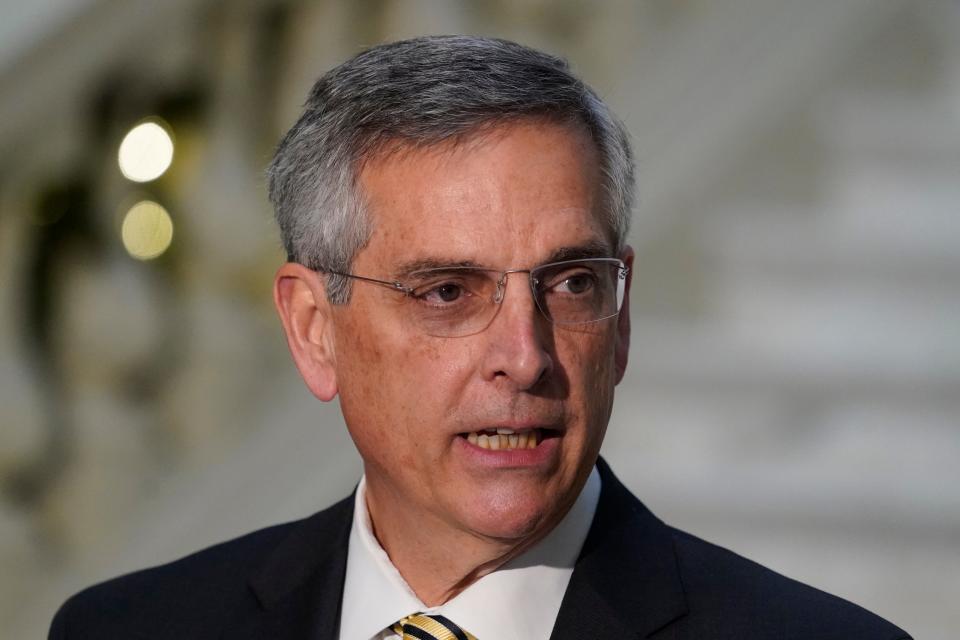'Election subversion' accusations: Donald Trump and allies look for new ways to challenge votes
- Oops!Something went wrong.Please try again later.
- Oops!Something went wrong.Please try again later.
WASHINGTON – For weeks after Election Day in 2020, then-President Donald Trump and his allies pressured state legislators and election officials to throw out votes, submit pro-Trump slates to the Electoral College or otherwise overturn the results in enough states to deny victory to Joe Biden.
It didn't work – but opponents fear that Trump and his supporters plan to try again in 2024 with the help of new laws.
As the former president ponders another campaign, Trump supporters and some Republican lawmakers in pivotal states are trying to make it easier to challenge and perhaps overturn future elections, analysts say, setting the stage for a crisis of democracy after the votes are tabulated in November 2024.
Trump's attacks on the 2020 election have triggered demands from some state Republicans to find ways of "overturning election results that they don't like," said Jessica Marsden, counsel to an organization called Protect Democracy.
"It's not normal partisan warfare," Marsden said. "It's fundamentally at odds with the basic rules of democracy."
By the numbers:President Donald Trump's failed efforts to overturn the election
'Violence and anarchy': Chaos erupts after Trump's unprecedented effort to overturn Biden's election win
In closely contested states like Georgia and Arizona, Trump supporters are pushing rule changes that would essentially give partisan officeholders the power to certify election results – or to refuse to certify them, as the case may be.
The goal, opponents say, is to take power away from the kinds of officials who resisted Trump's pressure to change the results in states that Biden won.
Most of the proposals have not been enacted, and changing the results of any election would be difficult because of public pressure and court rulings, analysts say. But the rising demands for partisan control of election processes is fueling worries that Trump and his allies might try to “steal” losing elections in 2022 and 2024, with violent consequences that strike at the heart of democracy.
Rick Hasen, a University of California, Irvine, law professor who hosted a recent symposium on what he calls "election subversion," defines the concept as manipulating the rules in ways that would enable "a loser of an election being declared a winner."
Hasen also has said he fears the Jan. 6 insurrection by Trump supporters at the U.S. Capitol was a "dress rehearsal" for 2024 and other future elections.
"Ironically, the conduct of former President Donald J. Trump in repeatedly and falsely claiming that the 2020 election was stolen has markedly raised the potential for an actual stolen election in the United States," Hasen wrote in a research paper.

The fruits of Trump's 2020 election protests
Election law changes being pushed by some Republicans in various states stem from Trump's continuing false claims of voter fraud in 2020.
Many proposals deal with what states do after votes are counted and before they certify elections and submit delegations to the Electoral College – items described as "election subversion" or "election sabotage."
In a new report, a research organization called the Voting Rights Lab said that "subversion bills have either been enacted or seen significant momentum in key battleground states, including Arizona, Florida, Georgia, Nevada, Ohio, Pennsylvania, Texas, Wisconsin, and others."
The report said that 17 state legislatures have introduced bills that would allow the legislature or other partisan officials to "exert greater control over the conduct of elections."
Sixteen states are considering laws designed to pressure election officials, from poll watchers to administrators, by creating new felony and misdemeanor laws to criminalize "even inadvertent, technical noncompliance with election rules," the report said.
Megan Lewis, executive director of the Voting Rights Lab, said too many states are "advancing legislation to undermine confidence in our elections and weaken the resiliency of our voting systems."
'Confusion and uncertainty'
In Georgia, the Legislature reduced the authority of Secretary of State Brad Raffensperger, who publicly refused Trump's demand to "find" enough votes for him to prevail over Biden in the state.
More: Trump pressured Georgia election investigator to find dishonesty in December phone call
More: Donald Trump endorses rival to Georgia Republican elections official Brad Raffensperger
A new Georgia law also removed the secretary of state as head of the State Election Board, which investigates claims of voters fraud and other irregularities. The Georgia Legislature now has the authority to appoint a majority of election board members and give that body the power to take over the election process in certain counties.

Trump has endorsed a GOP primary opponent for Raffensperger, as well as other election officials around the country who refused to help him overturn the 2020 election.
In Arizona, which Biden also won narrowly over Trump, the Legislature passed a law blocking the secretary of state – currently a Democrat – from representing the state on lawsuits dealing with elections. That authority now rests with the attorney general, currently a Republican, though that provision is scheduled to sunset on Jan. 2. 2023, when a new attorney general potentially takes office.
Another proposal in Arizona, not enacted so far, would allow the Legislature to basically ignore the result of the state's popular vote by revoking the secretary of state's certification and permitting the Legislature to select its own slate of presidential electors.
State Rep. Shawnna Bolick, a Republican who sponsored the legislation, wrote in a Feb. 8 op-ed for the Washington Examiner that "it is time for the Arizona Legislature to regain the power it delegated to certify the electors."
Bolick is now running for the Arizona secretary of state's job, pledging to pursue "election integrity."
Republicans are also seeking procedural changes in closely contested states that gave Biden his victory in the Electoral College, including Pennsylvania, Michigan and Wisconsin.
Opponents fear that election "audits" in Arizona, Texas and possibly other states could be used to justify changes in election systems.
A recent report by a trio of public interest groups – Protect Democracy, States United Democracy Center and Law Forward – described many of these plans as tools to give partisan election officials the power to sow "confusion and uncertainty about the results, creating openings for legislators to seize control of election outcomes."
Analysts said it's hard to assess how these new rules might play out in future elections. Some of the more radical proposals – such as giving legislatures the authority to throw out ballots or submit their own Electoral College slates – have not been approved by any legislature.
"The worst hasn't happened yet," said Lawrence Norden, director of the Election Reform Program with the Brennan Center For Justice at the New York University School of Law. "But, of course, if the worst happens, it may be too late to do anything about it."
Stealing the election?
Already, a rising number of people fear a more intensely protested election in 2024.
William Kristol, a conservative commentator who is backing Democratic candidate Terry McAuliffe in the Virginia governor's race, said he is very concerned Trump will try to "steal the election in 2024."
Speaking just before a debate between McAuliffe and Republican opponent Glenn Youngkin, Kristol said Trump "would be happy" to use new rules to overturn adverse election results in key states.
"It's worrisome," Kristol said.
Some analysts said that while the threat is there, it would not be easy to steal an election.
For one thing, public opposition would be a factor and could deter lawmakers from pursuing election subversion, said Julia Azari, associate professor of political science at Marquette University in Milwaukee.
Some Republicans would likely push back on the idea of overturning an election result, just as they did when Trump tried in the past year, Azari said. The courts also could intervene in cases in which votes were voided or elections overturned.
"The courts were pretty steadfast in 2020," Azari said. Courts rejected more than 60 legal challenges to various aspects of vote counting in 2020.
She added, however, that proposed election law changes are "still a concerning thing."
Opponents of the Republican push are advocating for federal election laws that would essentially override state rules making it easier to overturn elections. They are also calling for public vigilance.
Benjamin Ginsberg, a longtime Republican election lawyer, cited polls showing that millions of Republicans believe Trump's claims about the 2020 election.
Public officials need to work to convince some of those people that last year's elections were fair, and the ones in 2022 and 2024 will be too, Ginsberg said. They also need to be ready to respond if there are more 2020-style protests after future elections.
"There are storm clouds looming on the horizon," Ginsberg said. "Be aware and act accordingly."
This article originally appeared on USA TODAY: 'Election subversion:' Trump allies seek new ways to challenge votes

